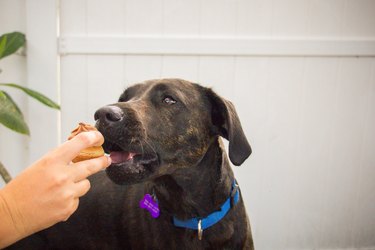
When you have pets, cleaning up after them is just part of the deal. Whether you're dealing with dog hair, poop, or muddy paw prints all over the rug, you clean up after your dog because you love her. While your dog may create all sorts of fun messes, you can be guaranteed that, sooner or later, your dog will also vomit. Dogs vomit for any number of reasons, but you can help your dog through a bout of stomach upset by knowing what to feed her after the episode, and when.
The cause of your dog’s vomiting
Video of the Day
There are countless potential causes of your dog's vomiting. In many instances, dogs vomit after they've ingested something that upsets their stomach. This could be a dead animal, garbage, grass, or just about anything else that they really shouldn't be eating. Referred to as "gastritis," this type of vomiting rids the dog's body of the harmful substance.
Video of the Day
If you notice your dog vomits during or just after a car ride, he may be experiencing motion sickness. Generally, this type of vomiting resolves fairly quickly after the car ride ends.
Other, more serious causes of vomiting include inflammatory bowel disease, liver or kidney disease, or obstruction after your dog has eaten a foreign body, like a piece of a toy. In these cases, the vomiting will be repetitive and feeding your dog according to guidelines for other less serious causes of vomiting won't resolve the issue. You should take your dog to the vet right away if he's vomiting blood or has other symptoms like diarrhea, listlessness, or lack of appetite.
Vomiting before or after eating
You may find that your dog often vomits before or after eating. If your dog vomits up liquid before a meal, her stomach acid levels may be too high, prompting her to feel sick. You may be able to solve this issue by giving your dog smaller meals that are spread out more frequently throughout the day. If your dog vomits only before breakfast, then giving her a treat or a snack just before bedtime may fix the problem.
It's common for dogs to vomit right after they eat, and this is usually caused by a dog bolting her food too quickly. A dog who is anxious about eating, or who is surrounded by other dogs during mealtime may feel the need to almost "inhale" her food, which can upset her stomach, causing her to vomit. To solve this problem, feed your dog in a quiet area where she can be alone during mealtime, or feed her using a dog dish specially designed to slow down the speed at which a dog can eat.
Feeding after a stomach upset
If your dog is vomiting and you suspect that he's merely dealing with stomach upset instead of a serious illness, withhold food for at least 12 hours to give your dog's stomach a chance to settle down. You can offer your dog ice chips so that he stays hydrated but can't gulp down a large amount of water.
When it is time to feed your dog again, offer him a small amount of boiled chicken and cooked white rice. Use skinless chicken and thoroughly boil it and the rice. Don't add butter or any other seasonings. This bland meal is easy on a dog's stomach.
If your dog keeps this meal down, then gradually increase the size of the meals that you give him. Over the next few days, mix the chicken and rice into your dog's regular dog food. Slowly increase the amount of dog food and reduce the amount of chicken and rice until your dog is back to entirely eating his regular food.
When to get vet help
If you follow the boiled chicken and rice diet and gradually introduce regular food, but your dog starts to vomit again, then it's time to consult with your vet. You should also take your dog to the vet if she exhibits other symptoms with the vomiting, such as diarrhea, lethargy, a distended abdomen, attempts at vomiting without actually producing anything, projectile vomiting, or loss of appetite.
Repeated vomiting is particularly dangerous for puppies since their bodies can't withstand the effects of vomiting. If you have a puppy who is vomiting, have her seen by a vet as soon as possible.
Always check with your veterinarian before changing your pet’s diet, medication, or physical activity routines. This information is not a substitute for a vet’s opinion.